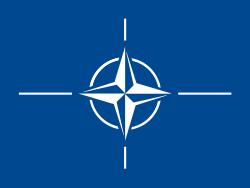
Back NAVO Afrikaans NATO GSW ኔቶ Amharic Organización d'o Tractau de l'Atlantico Norte AN नाटो ANP حلف شمال الأطلسي Arabic ناطو ARY حلف الناتو ARZ নাটো Assamese Organización del Tratáu del Atlánticu Norte AST
Organisation du traité de l'Atlantique nord | |
 Logo | |
 | |
Member states shown in dark green | |
| Abbreviation |
|
|---|---|
| Formation | 4 April 1949 |
| Type | Military alliance |
| Headquarters | Brussels, Belgium |
| Membership | |
Official languages | |
| Mark Rutte[3] | |
| Giuseppe Cavo Dragone | |
| Alexus Grynkewich | |
| Pierre Vandier | |
| Expenses | Total: US$1.474 trillion Excluding the US: US$507 billion[4] (2024) |
| Website | nato.int |
Anthem: "The NATO Hymn" Motto: "Animus in consulendo liber" | |
The North Atlantic Treaty Organization (NATO /ˈneɪtoʊ/ NAY-toh; French: Organisation du traité de l'Atlantique nord, OTAN), also called the North Atlantic Alliance, is an intergovernmental military alliance between 32 member states—30 in Europe and 2 in North America. Founded in the aftermath of World War II, NATO was established with the signing of the North Atlantic Treaty in 1949. The organization serves as a system of collective security, whereby its independent member states agree to mutual defence in response to an attack by any external party. This is enshrined in Article 5 of the treaty, which states that an armed attack against one member shall be considered an attack against them all.
Throughout the Cold War, NATO's primary purpose was to deter and counter the threat posed by the Soviet Union and its satellite states, which formed the rival Warsaw Pact in 1955. Following the dissolution of the Soviet Union in 1991, the alliance adapted, conducting its first major military interventions in Bosnia and Herzegovina (1992–1995) and Yugoslavia (1999). Article 5 was invoked for the first and only time after the September 11 attacks, leading to the deployment of NATO troops to Afghanistan as part of the International Security Assistance Force (ISAF). The alliance has since been involved in a range of roles, including in Iraq, in Libya in 2011, and to counter piracy.
Since the Cold War, the alliance has progressively enlarged, incorporating former Warsaw Pact countries and post-Soviet states. This eastward expansion has been a persistent source of tension with Russia, which views it as a threat to its security interests. The Russian annexation of Crimea in 2014 prompted strong condemnation from NATO and a renewed focus on collective defence. Russia's full-scale invasion of Ukraine in 2022 led to a major reinforcement of NATO's eastern flank and caused Finland and Sweden to abandon their policies of neutrality and join the alliance. Sixteen new members have joined NATO since 1990. The alliance currently recognizes Bosnia and Herzegovina, Georgia, and Ukraine as aspiring members.
NATO's main headquarters are in Brussels, Belgium, while its military headquarters are near Mons, Belgium. The combined militaries of all NATO members include approximately 3.5 million soldiers and personnel. Their combined military spending constitutes over half of the global total. Members have committed to a target of spending at least 2% of their gross domestic product (GDP) on defence to ensure the alliance's continued military readiness.
- ^ "Final Communiqué". NATO. 17 September 1949. Archived from the original on 6 December 2006. Retrieved 2 March 2024.
English and French shall be the official languages for the entire North Atlantic Treaty Organization.
- ^ "The North Atlantic Treaty". NATO. 4 April 1949. Archived from the original on 14 September 2011. Retrieved 2 March 2024.
This Treaty, of which the English and French texts are equally authentic ...
- ^ "Mark Rutte takes office as NATO Secretary General". NATO. Retrieved 1 October 2024.
- ^ "Defence Expenditure of NATO Countries (2014–2024)" (PDF). NATO.

